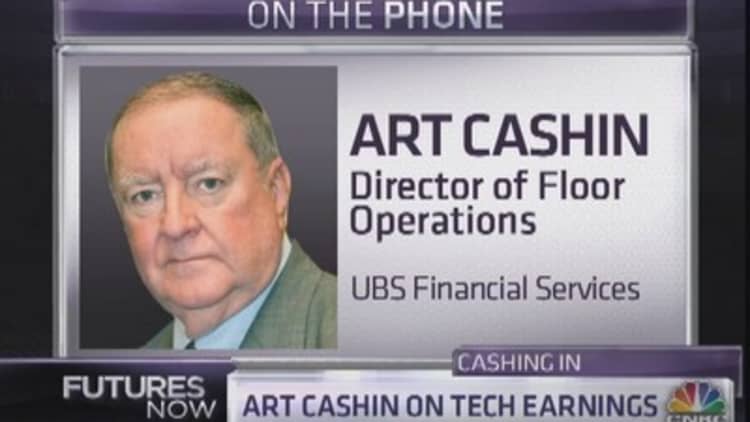
The way people are treating technology companies, it's starting to feel a bit too much like 1999 and 2000, Art Cashin said on Thursday's "Futures Now."
"I do worry a little bit that we're beginning to hear things that are reminiscent of the 1999-2000 period—the number of hits, the number of eyeballs," said Cashin, the director of floor operations for UBS Financial Services.
In the heat of the tech bubble, investors infamously valued site viewers—or "eyeballs"—more highly than revenue. In one of the most dramatic examples of this, Yahoo purchased Web hosting site GeoCities for some $3.6 billion in January 1999—despite the fact that GeoCities' expenses at the time were trumping the minuscule amount of revenue the company was taking in.
Yahoo overlooked the financials in favor of the fact that it was the third-most-visited site on the Internet. But as those visitors steadily disappeared, Yahoo's decision looked the opposite of prescient.
When Cashin surveys the tech landscape today, he similarly hears rhetoric that values users over profits.
"I think if we hold to the old tried-and-true—how many dollars are coming in—then we might be better served," Cashin said. "But people are extrapolating, in some way, in a manner similar to the way they did in 1999-2000."
Cashin notices a heavy emphasis on certain narrow types of tech businesses.
"We're beginning to see a case of old tech/new tech—and the key topic this earnings season is how deeply you are involved in cloud technology and/or can you make money on the mobile side," he said.
After all, Facebook rose sharply after its July earnings report showed strong mobile monetization. But with a price-earnings ratio of nearly 200 on Thursday as the stock hit a new all-time high, there is no comparing its valuation to a company like IBM, which has a price-to-earnings ratio of 12.
For Cashin, the de-emphasis of typical modes of valuation gives him a bad case of déjà vu.
"For an old fogy like me," the trend of extrapolating future earnings based on users and viewers "gets the warning flags flying," Cashin said.
—By CNBC's Alex Rosenberg. Follow him on Twitter: @CNBCAlex.
Watch "Futures Now" Tuesdays and Thursdays at 1 p.m. EDT exclusively on FuturesNow.CNBC.com!
Like us on Facebook! Facebook.com/CNBCFuturesNow.
Follow us on Twitter! @CNBCFuturesNow.



